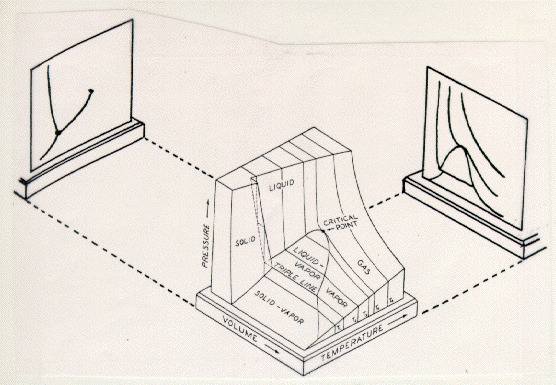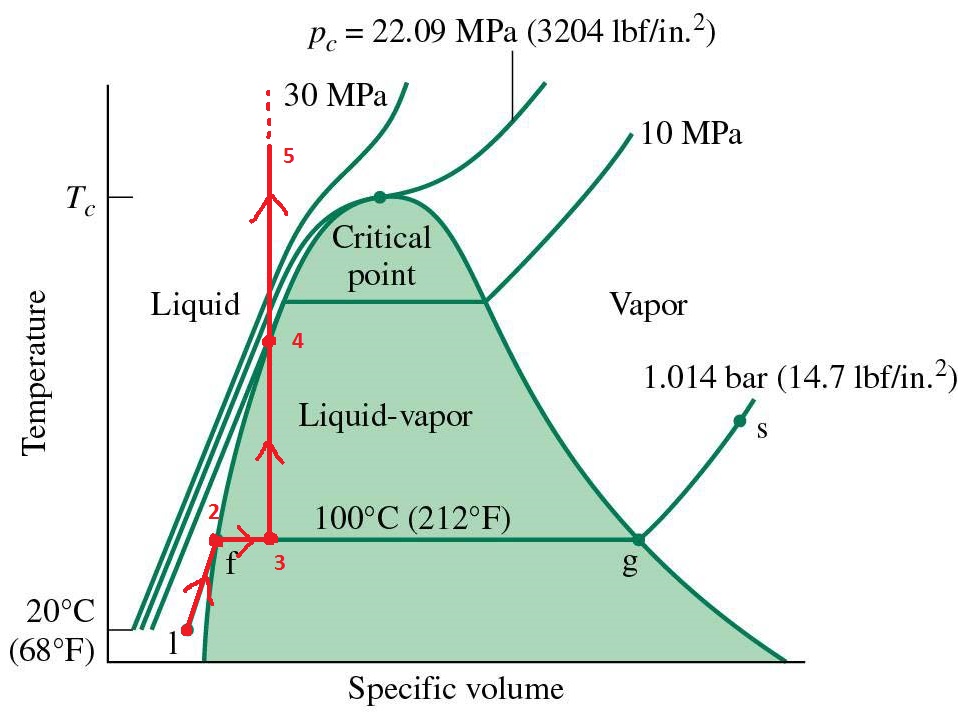The title says it all. When one fills a container (with water for example) and closes it so no air can escape from it, then heats the container continuously, can the liquid boil or completely evaporate?
-
2$\begingroup$ You ever seen one of those glass gizmos with a globe on each end? Contains some sort of liquid in a slight vacuum, as I understand it. You hold one globe with your hand and the liquid boils out of the globe, from the heat of your hand. $\endgroup$– Hot LicksCommented Jan 18, 2015 at 21:53
-
$\begingroup$ Is there any space for air (or some other gas) when the container is closed? $\endgroup$– MissMonicaECommented Oct 12, 2016 at 16:00
2 Answers
Yes, it will boil. Effectively, you will be heating it at constant volume. I'll try to explain what happens to the liquid (I'll assume water) as it boils. This image below shows the p-V-T (pressure, volume, temperature) phase diagram for water, which is a complex 3D surface:

We can project this surface downwards to create a 2D representation of this called the T-V diagram (the image above shows similar projections on the left and right for p-V and p-T):

This will help us to visualize what happens on the water phase diagram as it heats at constant volume.
We start at point 1, where we have water sitting in the container at atmospheric temperature, pressure and density. As we add heat, the state will follow a constant pressure line to point 2. At point 2, the water will start boiling. The temperature will stay constant as the heat energy added is going into latent heat for the state change. Once we get to point 3, the portion of the container that didn't initially contain water is now full of steam and it can't expand any more, as it is constrained by the container. From here, the state will follow a vertical, constant-density line - it will gain temperature and pressure as heat is added, but the density won't change. At point 4, the pressure has increased to the point where the steam will all turn back into liquid water - it's now obviously hotter than before and it's expanded to fill the container. Beyond point 4, the water will continue to increase in temperature and pressure and, once we exceed the critical point, we will have supercritical steam, which is neither liquid or gas, but has some properties of both.
Hope that helps!
-
$\begingroup$ But wont the saturated vapor pressure prevent any kind of boiling? $\endgroup$– adoionCommented Jan 18, 2015 at 22:37
-
$\begingroup$ Where will you have saturated vapor? If you are on the saturation line to the right of the critical point then further heating will increase the temperature and pressure and again you will eventually end up in the region of supercritical fluid. $\endgroup$– Time4TeaCommented Jan 18, 2015 at 23:10
-
$\begingroup$ @adoion Water isn't 100% incompressible, so it can be compressed, and that's what will happen, you have a constant volume, but the pressure will go way up. Even without going above the boiling point, just having the same number of molecules in a gaseous state will require much more pressure to stay at the volume of the originally liquid water. $\endgroup$– TimaeusCommented Jan 18, 2015 at 23:11
-
3$\begingroup$ I think it depends on whether you interpret the question to mean that the liquid is sealed in the container with some gas, or instead sealed in the container and completely occupying it, with no gas or area of vacuum in the container. If there's absolutely no gas/vacuum in the container then the liquid will boil -- after the container explodes. $\endgroup$ Commented Jan 19, 2015 at 17:21
-
3$\begingroup$ @Time4Tea - Explode is an understatement. It fairly often happens that an improperly installed water heater explodes, and it's not unusual for the unit to literally go rocketing through the roof. $\endgroup$ Commented Jan 19, 2015 at 19:04
i would assume if you were to have a container that can not burst and it's filled all the way to the top it would say a liquid as it can not expand altho the pressure would go up and the liquid would heat up but i do not know for sure but i'm confident that's what would happen. -Davis.A
-
$\begingroup$ Welcome on Physics SE and thanks for your answer :) Do you think you could explain your idea a bit more in detail - as it is now, at least I have trouble understanding it exactly. $\endgroup$– SanyaCommented Aug 7, 2016 at 8:25
